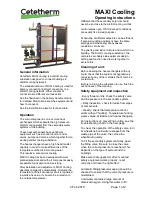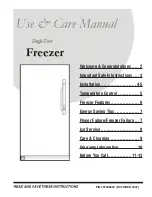
MAXI Cooling
Operating instructions
4 Feb 2019
Page 2 of 2
secondary circuits may lead to corrosion in the
system. This type of system should be filled as
infrequently as possible
.
If a fault develops, contact a skilled service
technician. For information about suitable ser-
vice companies, contact your energy supplier.
Only authorised personnel may work on the
system.
See important warnings:.
Troubleshooting chart
Symptom
Cause
Action
Secondary system tem-
perature too high or too low
Automatic control may need
adjusting
The control centre can be
adjusted. See separate
instructions
Not enough cold coming
from the system
Circulation pump not running
Check that the power is on and
that the fuses are OK.
Not enough water in the
system
Top up the system
Air pockets in the heat
exchanger or in the secondary
circuit
Bleed off the air in high points in
the secondary system
Annoying noise in the
secondary system
Pump capacity too high
Reduce the pump capacity by
choosing a lower output setting on
the pump, if available
Temperature “hunting” of
secondary system
Settings not correct
Adjust control parameters or call a
service technician
Secondary side flow too low
Increase the speed of the pump by
choosing a higher output setting (if
available) or adjust by opening a
balancing valve
Secondary system often
needs topping up
The expansion vessel cannot
handle the changes in volume.
Call service technician to check
the volume take-up and pressure
priming of the expansion vessel, or
possible leakage
Leakage
Secondary side temperature
too high
District cooling filter clogged
Contact a service technician
District cooling water
temperature too high
Contact the district energy supplier
See also the installation instructions.
Warning!
Children must not be left unattended in the area of the district cooling substation.
High pressure water may escape when you open safety valves, drain cocks, filters and air
bleed valves. Take care.
To maintain the CE-marking status of the product, any replacement components fitted must
be identical to those replaced.
Make sure that supplied or after- mounted safety equipment works properly, is set correctly
and have the right effect, to avoid wrong-tempered water to reach the building.




















